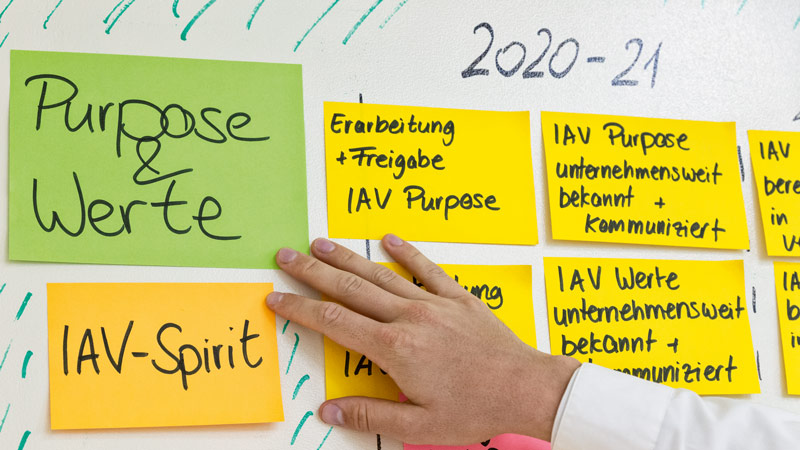“Huge Opportunity for Premium Development Partners”
IAV China is rapidly growing. This is why January saw the company move to a new site in Shanghai which provides space for further staff and infrastructure. In the automotion interview, Kaweh Feyzi, Managing Director of IAV China, reports on current trends in the Middle Kingdom and his plans for the future.
Mr. Feyzi, why was it necessary to move to a new location?
Kaweh Feyzi: We have grown rapidly in recent years and need workshop floorspace in addition to modern workplaces for our strategic growth. From 2011 to the present day, our staff number have almost tripled. And this is likely to continue. In 2023, we will be employing around 400 members of staff in China. At our new site, we have around 1,000 square meters of office space and 500 square meters for workshop and laboratory. This space will be sufficient for this year, but in 2020 we will probably rent the next floor. Step by step, this will allow us to grow as planned and achieve our goal. We want to be the technological premium partner for innovative topics in China. In addition to recruiting more staff, we will also be expanding our expertise.
Which competencies will you be using to attract new customers in China?
Feyzi: We want to focus on five centers of excellence: powertrain, i.e. engine and transmission development both for conventional and electric drive systems, including battery development; connectivity, taking into account HMI and infotainment systems; highly automated driving; chassis as well as body & safety.

How do you work with your colleagues in Germany in your projects?
Feyzi: That varies quite a lot, and depends on the particular project. Some projects are handled entirely in China by our own team, some are relatively equally divided, whereas in others, our colleagues in Germany take on the lion’s share. Our goal is to steadily increase the share of local project work done with local competencies.
How hard is it to get the necessary specialists in China?
Feyzi: Although many young academics leave Chinese companies every year, it is still hard to meet our requirements here because of the high demand. That is why we are also looking for new employees in other countries, including Germany. And we are seeking dialog with the universities to draw students’ attention to us. Our new location is particularly well suited for doing this. Not only is it in the proximity of our customers but also close to the renowned Tongji University. We maintain a lively dialog with the professors there and want to further expand our cooperation. In addition to new employees, however, it is equally as important to keep existing colleagues over the long term. This is why we have already initiated a number of measures, and others are being evaluated in a move to become the top employer in the automotive engineering segment in China.
Which trends and topics are currently defining the market in China?
Feyzi: Until 2017, sales figures rose continuously to 24.7 million vehicles per year. Last year then saw a decline of ten percent. At the same time, however, the demands on the quality of products are increasing. This represents a tremendous opportunity for us as a premium development partner.
As far as the topics are concerned, there is currently a demand for expertise in electric mobility, battery development, highly automated driving, connectivity and mobility concepts.
— Managing Director of IAV China
China is regarded as a pioneer of e-mobility. How is this manifest on the roads?
Feyzi: China is, in fact, far ahead of us. The country already has 1.3 million electric vehicles and over 700,000 recharging stations. In Shenzhen, all local public transport buses and 99 percent of all taxis are electric today. By 2025, 20 percent of all private vehicles are to be electric – this is part of the “Made in China 2025” initiative which aims to restructure Chinese industry towards high-tech. The country was also quick to secure key resources, such as cobalt, which are indispensable for battery production.
How strong is the competition from domestic companies?
Feyzi: Besides us, of course, there are other development partners, both from China and from Western countries. I don’t regard many of the local companies so much as competitors, but rather as potential partners. There are, for example, many startups from the IT sector who understand a lot about software but little about vehicles. As they are not familiar with the challenges facing the automotive industry, this is an area that lends itself to working with us.
Which part will China play in automotive engineering in the future?
Feyzi: In the past, most of our development work was in Europe and we then localized in China. Today, we develop for China in China. In future, many new technologies will be developed in China – in part – for the rest of the world. The country provides a good environment for trying out new things. People see innovations very positively, and the pace is higher. This begins as early as an initial exchange of ideas and continues through to the end of the project.
The interview was published in automotion 02/2019, the automotive engineering magazine of IAV. Here you can order the autmotion free of charge.
